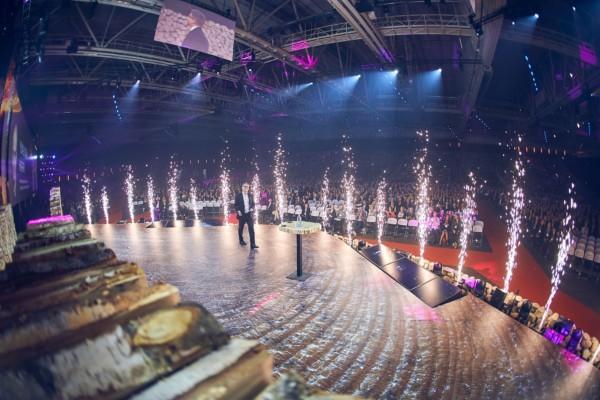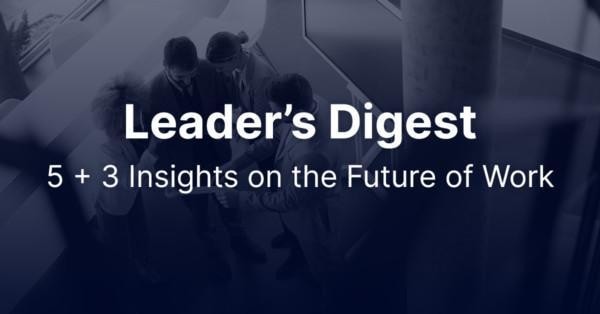13Apr2022
What should leaders focus on in the near future to make their organizations thrive?
Over the past few weeks, we have heard 30 keynotes at our Speaker Contest semifinals. Looking back, we noticed that there were a few topics that were highlighted more frequently than others. So here, we open up the five issues that several speakers emphasized for leaders in terms of the future of work.
Creativity
Several speakers raised the importance of creativity in the workplace to be one of the keys to succeed in the future of work.
For example, Duncan Wardle reminded us that we are all born creative, but we just forget that when we grow up. To find this creativity again, he introduced a few practical tricks. One of them was to first make a list of rules. Then, choose one rule and ask the question “what if” to change that fundamental rule and follow a new line of thought. Duncan finally underlined that the most employable skills for the next decade will be: creativity, intuition, curiosity, and imagination.
Also Marcus John Henry Brown stated that “every employee is a potential creative artist”. He then suggested that we use the corporate artist process to “unleash divergent thinking”. One of the practical ideas included in this process is to have an “art factory” in your organization – a space for mentoring, studying, and activities like individual assessments, drawing or photography workshops, and field trips or creative walks.
Empathy & Connection
Empathy and human connection were also issues that were pressed in multiple speeches.
Enni-Kukka Tuomala for instance, claimed that empathy is the “most radical” human emotion, and the foundation for all strong communities. She explained that empathy is all about different points of view, understanding what other people bring to the table, or even adopting someone else’s emotional state. According to Enni-Kukka, there is a huge opportunity to use this emotion to create a more meaningful work environment. “How will you become an empathy leader?” she asked.
Also Ingrid Tappin talked about the importance and potential of empathy by explaining her model of radical compassion. Ingrid argued that to become future-proof, organizations have to become more human by fostering the three forms of radical compassion: radical compassion for the self, for the society, and for the other. Ingrid explained that by applying radical compassion, a diverse, inclusive, and resilient global workforce can be born.
Additionally, we heard multiple times the need to connection. Simone Heng, for example, argued that connection matters as it leads to happiness which in return leads to greater productivity, retention, and profitability. Unni Turrettini, on the other hand, mentioned that loneliness can have high costs in companies and in the workplace. Both emphasized the importance of not only connection to others, but also the connections to one self. Simone put it well by saying that “we cannot connect well with other people when we cannot connect well with ourselves”.
Employee Well-Being
Several speakers also underlined that leaders should put more attention to employee well-being.
For example, Agnis Stibe, acknowledged that around the world “burnout has been a growing pain over the last decade”. To avoid that he suggested that we have to change the way we think, our habits, our traditions, and our routines.
Mariska Kesteloo, on the other hand, called for leaders to build workplaces where also the difficult emotions and the hardships of life can be a part of our daily conversations. “We need to create situations where employees and your team can talk about loss and grief and show their emotions”. And what if you don’t? According to Mariska, pushing these issues aside can lead to burnout, depression, or people leaving the company.
Additionally, Friedrike Fabritius touched upon employee well-being but from a slightly different perspective. She explained how neuro signature diversity shapes our personality, which is why we also need different working environments to achieve high performance. While sensation seekers love stress, challenge, and competition, the deep thinkers require calmness to reach their peak performance. Friedrike claimed that leaders need to put more effort into catering all kinds of personalities, where deep thinkers can focus and sensation seekers can go wild and explore. “Don’t change the people, change the workplace.”
Flexibility
The notion of flexibility and adaptability as well came up during a few keynotes.
According to Nicholas Strenholm, this ever-changing operational environment requires flexibility. He cited Ashby’s Law of Requisite Variety and explained that for a system to be able to survive in a fast-changing environment it has to change at the same pace as the environment. This requires orgaizations to find and allow unpredictable solutions. Nicholas stated that instead of trying to make things safe and predictable, organizations should allow freedom to try crazy ideas to adapt and change. By doing that you can “find unpredictable solutions in an unpredictable future of work”.
Kevin Cottam, on the other hand, highlighted the importance of flexibility from another angle. He explained that we are often trapped in certain processes, mindsets, and systems, and to move forward we should identify the traps around us. Kevin argued that the future of work calls for mobility and a cross-population of ideas, and will be circular, inclusive, and diverse. To achieve this, we should find the traps that surround us, flow with the tasks at hand, and free our mindset.
Sustainability
The urgency and relevance of sustainability might be (and hopefully is) obvious to most when talking about the future of work. And many of the speakers also accentuated the need for change and provided ways to move forward.
Firstly, Stefan Hyttfors asked for leaders to switch their mindset from more to less. He underlined that in the world we live in, you should use the golden rule of less any time you have to make tough decisions. Stefan explained that today companies seek to attract followers instead of customers, and to get them, you “ have to talk a whole lot more than about your products.”
Suvi Auvinen as well empahsized the urgency of sustainable actions. She highlighted the real need for actions as your stakeholders don’t really care about the words—they are not enough. She urged leaders to forget sustainability reports and instead to “do something worth noticing”, and “tell everyone about your sustainability actions”.
Hery Henry approached sustainability from the perspective of behavioral science. “Humans are excellent at making individual choices, but really rather lousy at making collective ones.” He advised us to use methods like power questions, data transparency, and framework of personal choice in order to make the necessary decisions that will promote more sustainable business practices.
We also heard from Elin Hauge, who approached sustainability from a technological perspective by saying that “digital is not necessarily sustainable” unlike many tend to think But it can become sustainable if we, for instance, demand green computation power from cloud platform providers, build a culture of computation efficiency, and reusing and recycling hardware.
…And More
There were actually many other excellent points, such as diversity and purpose, that were raised on the aspect on the future of work and leadership. So, for more ideas and tools on how to make your organization thrive in the future, watch the recordings of these short keynotes on our Speaker Contest website or on our Youtube channel.
The grand finale of the contest will be held on the 31st of May. To learn about culture, future of work, and sustainability from our six finalists, join the free live stream of our Speaker Contest semifinal.

 by:
by: 
